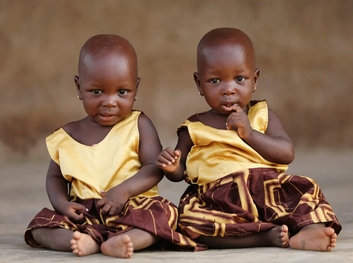
support@yorubalibrary.com
+2348073529208, 07038599574

Twins hold a unique and revered position in Yoruba culture, symbolizing various spiritual and cultural beliefs. The Yoruba people, primarily located in southwestern Nigeria, have one of the highest rates of twin births in the world. This article explores the significance of twins in Yoruba culture, examining their spiritual, social, and cultural impact.
Spiritual Significance of Twins
In Yoruba culture, twins are believed to possess special spiritual powers. They are often regarded as divine beings or messengers from the gods. The Yoruba term for twins is "Ibeji," which translates to "double birth." The birth of twins is seen as a blessing, and they are thought to bring good fortune and prosperity to their family.
• Orisha Ibeji: In Yoruba religion, Ibeji is an Orisha (deity) that represents twins. Devotees often worship Ibeji to seek protection, fertility, and blessings. Offerings and rituals are conducted to honor Ibeji, ensuring the twins’ well-being and harnessing their positive influence.
Social and Cultural Roles of Twins
Twins in Yoruba culture play important social and cultural roles. They are often celebrated with special ceremonies and given unique names that reflect their status.
• Naming Ceremony: The naming ceremony for twins, known as "Isomoloruko," is a significant event. The firstborn twin is typically named "Taiwo," meaning "the first to taste the world," while the second twin is named "Kehinde," meaning "the one who comes after." These names reflect the belief that Taiwo is sent first to explore the world, and Kehinde follows to ensure safety.
• Ere Ibeji: To honor and protect twins, Yoruba families often create wooden carvings called "Ere Ibeji." These figures represent the twins and are believed to house their spiritual essence. Families care for these carvings as they would the twins themselves, offering food, clothing, and prayers.
Celebrations and Festivals
Twins are celebrated in various festivals and cultural events within Yoruba communities. These celebrations highlight the special status of twins and reinforce their cultural importance.
• Twin Festivals: Annual twin festivals, such as the one held in Igbo-Ora, a town renowned for its high twin birth rate, attract thousands of twins and their families. These festivals feature traditional music, dance, and rituals to honor the twins and seek blessings from Ibeji.
Twin Mortality and Mourning Practices
While twins are celebrated, the high twin birth rate is also accompanied by significant twin mortality rates. The Yoruba have developed unique mourning practices to cope with the loss of a twin.
Conclusion
The significance of twins in Yoruba culture is deeply rooted in spiritual beliefs, social practices, and cultural traditions. Twins are considered special beings with unique powers and roles within their families and communities. Through rituals, festivals, and artistic expressions like Ere Ibeji, the Yoruba people celebrate and honor the presence of twins, underscoring their importance in the cultural fabric of Yoruba society

Learn about the Yoruba concept of Ìwà Pẹ̀lẹ́ (good…

Learn special praises for Divine Being and Creator…